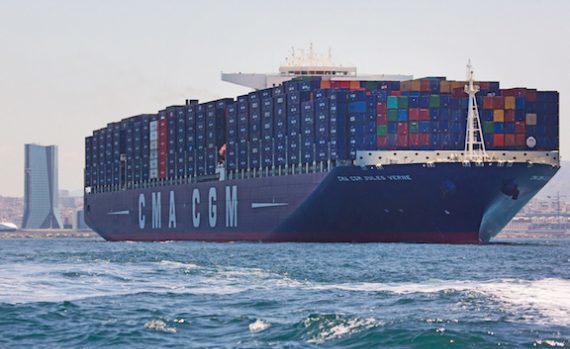France’s joined-up thinking gives it the lead in race for LNG as a ship fuel

Public and private sectors have come together to push the European nation to the front of the LNG bunkering revolution. Chief correspondent Jason Jiang reports.
With the IMO’s tightening regulations on ship emission standards, LNG has been promoted as an alternative to heavy fuel oil for the shipping sector. However, the shipping industry still hasn’t seen large scale global application of LNG propulsion technology, mainly due to a lack of bunkering facilities and financing, and volatile oil prices.
Now France is taking a lead in this regard with public and private sectors coming together to ensure the European nation is ahead of the pack with this new ship fuel with more joined-up thinking on the issue than in most other nations.
France will modify regulations on LNG to allow refuelling to take place at ports and consider changing fiscal rules on amortising investment in new ships or engine technology.
Under the call of the government, a number of French companies have stepped up to jointly promote the adoption of LNG as ship fuel.
Speaking at a maritime conference in the port of Le Havre in November last year, French prime minister Edouard Philippe said the country has to grasp the energy transition and equip French ports with LNG infrastructure.
French shipping line CMA CGM announced at the end of November that it will become the first container line to run an ultra-large container ship on LNG. It will equip nine 22,000 teu newbuildings, the largest boxships in the world, with all the equipment necessary to run on natural gas. These mega ships will also be among the very first merchant vessels to run transoceanic routes on LNG. They are to be classed by France’s Bureau Veritas, an organisation that has done a vast amount of research into gas as a future ship fuel.
“The use of LNG by large containerships is an emerging market aiming for significant growth. The new regulations on sulfur emissions that will be in effect in 2020 are changing the rules and are opening the door to new solutions. The challenges we are facing today are as important as tomorrow’s issues: make LNG the best alternative to conventional fuels,” said Farid Trad, head of bunkering at CMA CGM.
CMA CGM is currently working with its partners towards an operational, regulatory and technical framework that will allow a ship to receive LNG without disrupting commercial operations.
Shortly after the announcement, CMA CGM and French energy giant Total signed an agreement covering the supply of around 300,000 tons of LNG a year for 10 years starting in 2020. Earlier in 2017, CMA CGM and Total already signed a cooperation agreement to examine the most environmentally responsible propulsion solutions to meet the IMO’s 2020 implementation date for new sulfur regulations.
“CMA CGM’s decision to adopt LNG propulsion for its new build container ships sends a strong signal to the maritime world,” said Patrick Pouyanné, chairman and CEO of Total. “The wider use of LNG as a fuel is an important component of Total’s LNG strategy, and we are delighted to support CMA CGM as it implements this ambitious project. This agreement highlights our involvement in developing dedicated supply chains for this new fuel. We are once again demonstrating our ability to provide customized energy solutions to our customers.”
In January, French bank Societe Generale became the first financial institution to sign up to SEA\LNG, the multi-sector industry coalition aiming to accelerate the widespread adoption of LNG as a marine fuel.
According to Paul Taylor, global head of shipping finance of Societe Generale Corporate & Investment Banking, the bank has been pioneering the use of LNG as a marine fuel in France, as well as on a global basis. In addition to the participation in SEA\LNG coalition, Societe Generale was also able to implement a Green Shipping Guarantee programme with the European Investment Bank in order to facilitate the financing of greener transportation projects.
“France is a strong leader in both oil and gas and shipping; it has over 3,400km of maritime frontiers, making the country one of the gateways to imports into Western Europe. These are all positive factors which have contributed to France being at the forefront of the use of LNG as a marine fuel,” Taylor says.
Furthermore, the COP21 climate summit held in Paris attracted a lot of attention from the French population, encouraging them to embrace cleaner energy.
There is also a very strong tradition of French engineering in LNG. For example, GDF was one of the first companies to build an LNG tanker whilst GTT designed the LNG membrane containment system now in use across the majority of the LNG fleet trading today.
The Port of Le Havre in northern France is one of the first ports worldwide to promote LNG bunkering. CMA CGM and Total are preparing to supply future vessels with LNG at the port
Annie Vandome, a spokesperson for the port, explains how the French government and the transport ministry created a coordination mission in 2012 for the use of LNG as a marine fuel to make all operators aware of the then expected strict revision of the rules concerning CO2 emissions and air pollutants as part of the EU policies on climate and air quality.
The French law of energy transition in 2015 for green growth included a chapter dedicated to clean transport and air quality fostering pilot actions in favour of the systems of LNG supply in ports for vessels and boats. In France, a gas-fuelled maritime future is very much dawning.
